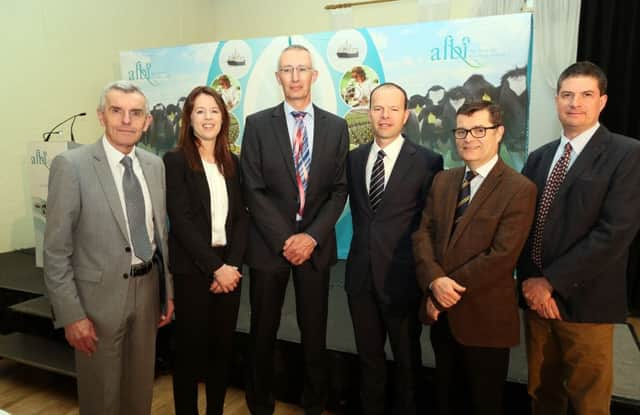'˜New data-sharing world presents opportunities'


The all-day conference ‘AFBI Science: Shaping Livestock Farming for 2030’ on Tuesday March 28 heard how remote sensing and a range of other new technologies are set to reveal unprecedented insights for livestock farmers in areas such as hoof health, milk content, herd fertility and feed intake within the individual animal.
Delegates also heard how recent advances in areas such as DNA-based technologies are broadening understanding of disease transmission and providing opportunities to reduce susceptibility to infectious diseases. Digital agriculture could also be used to seamlessly link efficient production with environmental governance, product assurance and provenance.
Advertisement
Hide AdAdvertisement
Hide AdThe conference, which took place at The Dunadry Hotel on Tuesday (March 28), attracted international experts from New Zealand, the Netherlands, England and the Republic of Ireland.
Speakers included Dr Theun Vellinga of Wageningen University in the Netherlands; Professor Ian Yule of Massey University in New Zealand; Joe O’Flaherty Chief Executive of Animal Health Ireland; and Tim Bennett, Deputy Chair of the Food Standards Agency Board and Chairman of the UK Centre of Innovation & Excellence in Livestock (CIEL).
AFBI speakers included Professor Robin Skuce, Dr Debbie McConnell, Dr Conrad Ferris, and Professor John Davis.
One of the key talking points at the conference was the need to reduce the impact of farming systems on the environment. Dr Theun Vellinga highlighted the current position in the Netherlands where dairy cow numbers were being reduced by up to 100,000 cows in order to reduce phosphorus losses to waterways.
Advertisement
Hide AdAdvertisement
Hide AdDr Conrad Ferris from AFBI highlighted that whilst good progress had been made in reducing phosphorus loss to waterways in Northern Ireland, we needed to build on this progress locally. Dr Ferris also indicated that further significant progress could be made by targeting interventions at the relatively small area of land that had a high risk of phosphorus run off.
In the subsequent discussion, speakers highlighted the opportunity that would exist post-Brexit to develop specific policy measures targeted at the relatively small land area that posed the greatest risk of phosphorus loss.
According to AFBI CEO Dr Sinclair Mayne: “New technologies enable precision understanding of complex biological systems through the management of individual fields and animals. New data capture and analytical methods will also offer huge efficiencies in terms of resources and labour saving.”
He added: “One of the biggest challenges for farmers is how to combine and interrogate datasets in order to get really useful information about to improve their businesses. Our conference has provided practical advice to farmers on how they can prepare for this, and the many other challenges, that lie ahead.”
Advertisement
Hide AdAdvertisement
Hide AdAlso at the conference, AFBI launched a booklet highlighting examples of where AFBI research has made a significant industry impact including: innovative online carcase benchmarking tools for improving the profitability and competitiveness of cattle, sheep and pig production; evidence for increasing EU fish quotas; and successful applications for derogations from the Nitrates Directive.
For further information about AFBI research log on to afbini.gov.uk